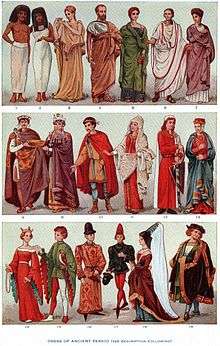Abolla
An abolla was a cloak-like garment worn by ancient Greeks and Romans. Nonius Marcellus quotes a passage of Varro to show that it was a garment worn by soldiers (vestis militaris), and thus opposed to the toga.

Two men wearing abollas, as seen on the bas-reliefs on the triumphal arch of Septimius Severus at Rome.
The abolla was, however, not confined to military occasions, but was also worn in the city.[1] It was especially used by the Stoic philosophers at Rome as the pallium philosophicum, just as the Greek philosophers were accustomed to distinguish themselves by a particular dress.[2] Hence the expression of Juvenal facinus majoris abollae merely signifies, "a crime committed by a very deep philosopher".[3][4][5]
The word abolla is actually a Latinization of the Greek ambolla (ἀμβόλλα) or anabole (ἀναβολή), for a loose woolen cloak.[6]
See also
References
- Suetonius, Caligula 35
- Mart. iv. 53, viii. 48
- Juvenal, iv. 75
- Heinrich, On Juvenal l.c.
- Becker, Gallus vol. ii. p. 99
- Smith, William (1870). "Ambolla". In William Smith (ed.). Dictionary of Greek and Roman Antiquities. 1. Boston: Little, Brown and Company. p. 2. Archived from the original on 2010-02-13.
Other sources
- The Wordsworth Dictionary of Phrase and Fable

External links
- Abolla (article in Smith's Dictionary of Greek and Roman Antiquities)
This article is issued from Wikipedia. The text is licensed under Creative Commons - Attribution - Sharealike. Additional terms may apply for the media files.
